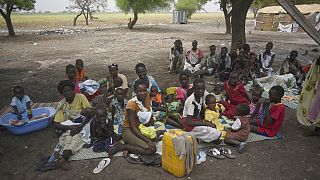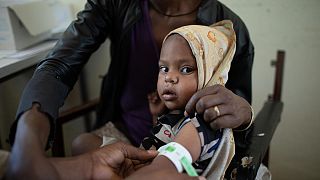Women's Health
According to a UNICEF report unveiled Monday (Mar. 6), 12 countries among whom 10 are in Africa are hardest hit by the global food and nutrition crisis among adolescent girls and women.
The report calls for governments, development and humanitarian partners and donors, civil society organizations and development actors to transform food, health and social protection systems for adolescent girls and women.
5.5 million pregnant and breastfeeding adolescent girls and women suffered of acute malnutrition in 2020, 6.9 million are now affected.
Undernourished and Overlooked: A Global Nutrition Crisis in Adolescent Girls and Women – issued ahead of International Women’s Day – warns that the ongoing crises, aggravated by ongoing gender inequality, are deepening a nutrition crisis among adolescent girls and women that has showed little improvement.
"Without urgent action from the international community, the consequences could last for generations to come," UNICEF Executive Director Catherine Russell.
In Amboasary commune, southern Madagascar, Maho came to an hospital with her daugther and grandchild: "We are here because there is no rain and there is "Kere" (famine) in our community."
"The lack of food in our community has affected our health. When my daughter gave birth, she did not have enough to eat and could not produce enough milk for her baby. The baby has severe forms of malnutrition because the mother does not have enough milk to feed him. Currently, both mother and child are not in good health."
According to the report – an unprecedented and comprehensive look at the state of adolescent girls’ and women’s nutrition globally – more than one billion adolescent girls and women suffer from undernutrition (including underweight and short height), deficiencies in essential micronutrients, and anaemia, with devastating consequences for their lives and wellbeing.
Inadequate nutrition during girls’ and women’s lives can lead to weakened immunity, poor cognitive development, and an increased risk of life-threatening complications – including during pregnancy and childbirth – with dangerous and irreversible consequences for their children’s survival, growth, learning, and future earning capacity.
Globally, 51 million children under 2 years suffer stunting, meaning they are too short for their age due to malnutrition. Of those, about half become stunted while pregnant and the first six months of life, the 500-day period when a child is fully dependent on maternal nutrition, according to a new analysis in the report.
South Asia and sub-Saharan Africa are home to 2 in 3 adolescent girls and women suffering from underweight globally, and 3 in 5 adolescent girls and women with anaemia.
In 2021, there were 126 million more food insecure women than men, compared to 49 million more in 2019, more than doubling the gender gap of food insecurity.
Scaling up efforts
Since last year, UNICEF has scaled up its efforts in the countries hardest hit by the global nutrition crisis, including Afghanistan, Burkina Faso, Chad, Democratic Republic of the Congo, Ethiopia, Haiti, Kenya, Madagascar, Mali, Niger, Nigeria, Somalia, South Sudan, Sudan, and Yemen, with an acceleration plan to prevent, detect, and treat wasting in women and children.
Among others measures the report urges governments, development and humanitarian partners and donors, civil society organizations to support:
-Prioritising adolescent girls’ and women’s access to nutritious, safe and affordable diets, and protecting adolescent girls and women from ultra-processed foods through marketing restrictions, compulsory front-of-pack labelling and taxation.
-Implementing policies and mandatory legal measures to expand large-scale food fortification of routinely consumed foods such as flour, cooking oil and salt to help reduce micronutrient deficiencies and anaemia in girls and women.
-Ensuring adolescent girls and women in low- and middle-income countries have free access to essential nutrition services, both before and during pregnancy, and while breastfeeding, including ante-natal multiple micronutrient supplements.
-Expanding access to social protection programmes for the most vulnerable adolescent girls and women, including cash transfers and vouchers to improve girls’ and women’s access to nutritious and diverse diets.
-Accelerating the elimination of discriminatory gender and social norms such as child marriage and the inequitable sharing of food, household resources, income and domestic work.












01:49
BRICS summit ends on health issues and role of global south countries
00:50
Ons Jabeur retires from Wimbledon Opener due to breathing issues
11:15
AI drones lead breakthrough against malaria in Africa [Business Africa]
01:29
Experts warn of danger of exercising in extreme heat and humidity
Go to video
Oil flip-flops and shares are mixed after the US strikes Iranian nuclear sites
01:52
Catholic Church urged to help more as education costs in Africa rise